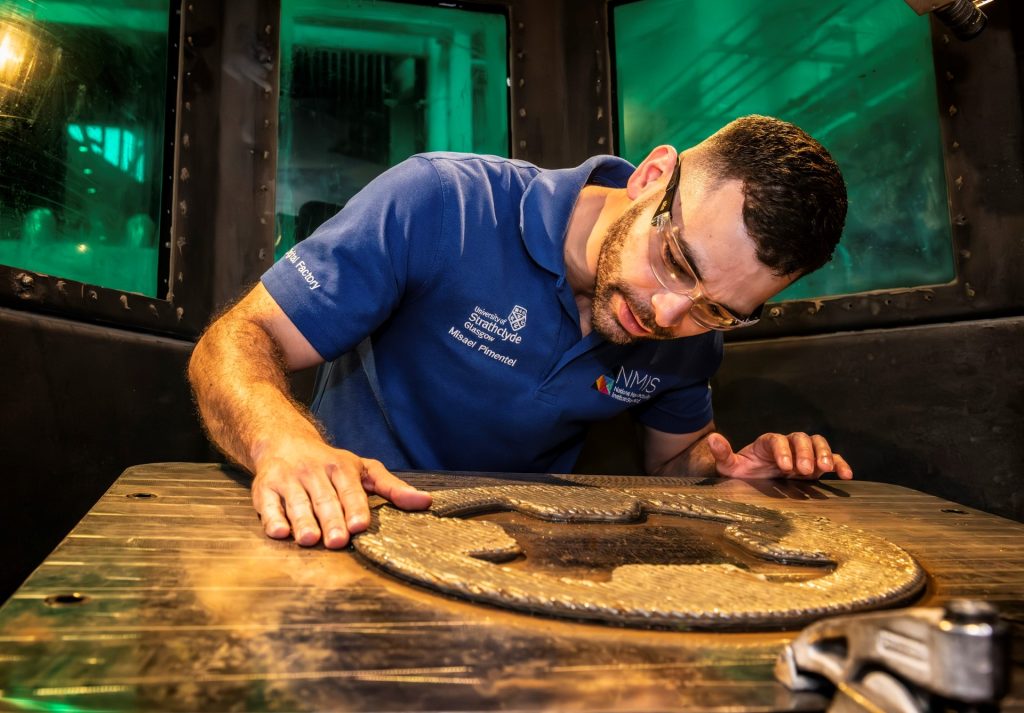A project using large-scale additive manufacturing to produce shipbuilding components has completed its second phase, with results showing strong potential to reduce greenhouse gas emissions, secure supply chains and deliver significant economic benefits for the maritime sector.
The project’s redesigned metal component – a topology optimised tapping ring – delivered a 10% reduction in emissions, cut lead times by 90% and reduced vessel weight by 13% in testing.
Led by Glasgow-based Malin Marine Consultants (MMC), part of Malin Group, with support from the National Manufacturing Institute Scotland (NMIS) – operated by the University of Strathclyde – Marine Vessel Lightweighting (MariLight) 2.0 builds on an initial feasibility study aimed at shifting the shipbuilding sector away from traditional manual fabrication towards automated, flexible, and environmentally friendly manufacturing approaches.
Large-scale additive manufacturing supports sustainability by producing lighter, topology-optimised parts locally and on demand, significantly cutting material waste, energy use, and emissions compared with conventional fabrication methods.
As part of the project, advanced digital manufacturing techniques were applied to improve component design and performance. A key milestone was the successful testing of a topology-optimised tapping ring – a metal component used to reinforce openings cut into vessel decks or tanks, providing secure access points.
The redesigned part allows for more efficient use of material, enhancing structural performance while reducing weight. It underwent rigorous hydrostatic and leak testing under sustained pressure, which project partner Lloyd’s Register witnessed to ensure independent verification of the tests – a crucial step towards wider shipbuilding sector adoption.
The tapping ring was manufactured using Direct Energy Deposition-Arc (DED-Arc) technology at NMIS’s Digital Factory – an additive manufacturing process that builds metal parts layer by layer using advanced welding techniques. This enabled local, on-demand production of lighter, optimised components with minimal material waste.
Other project partners included BAE Systems, Caley Ocean Systems (part of the Pryme Group), Siccar, Altair, and Hexagon Manufacturing Intelligence (HMI). Altair produced the topology optimised design for the tapping ring using their design optimisation software (Altair Inspire and Altair Optistruct). HMI provided advanced computational modelling solutions, simulating the DED-Arc process and assessing factors such as temperature gradients and distortion prediction. Siccar delivered a secure data-sharing platform, enhancing supply chain transparency through data traceability and real-time access to verified information.
Misael Pimentel, MariLight 2.0 project lead at NMIS, said: “MariLight 2.0 showcases the real-world potential of large-scale additive manufacturing in the maritime sector. By combining advanced digital processes with rigorous certification protocols, we’ve demonstrated how this technology can support more sustainable, efficient production methods. This project highlights NMIS’s ability to help industry transition to cleaner, more agile manufacturing and helps Scotland progress towards net zero ambitions.”
MariLight 2.0 was funded by the Department for Transport’s Clean Maritime Demonstration Competition (Round 4) and supports the UK’s commitment to achieving net-zero maritime emissions by 2050.
For more articles like this, visit our Innovation channel




